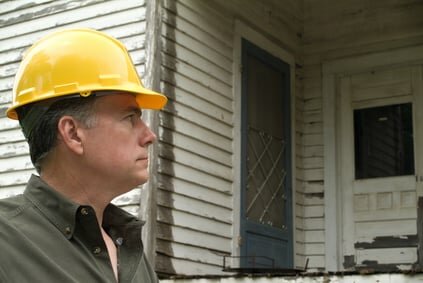As a buyer, one of the smartest things you can do is get a home inspection. It’s arguably more important than getting an appraisal, because a proper inspection will prevent you from buying a money pit - at least unintentionally.

Avoid a money pit, always have your home inspected by a professional © Jake Hellbach - Fotolia.com
A good home inspection will identify both major and minor problems in the physical condition of the home. For example, the inspector can identify issues such as structural problems, (termite damage), mechanical problems (heating and air conditioning) or construction defects.
His report will identify the problem areas, explaining what needs to be either repaired or replaced, and it will give you an estimate of the expected lifetime remaining on the major systems in the home.
A home inspector will begin with a review of the home as a whole and then break it into sections, checking each area carefully looking for signs of wear and tear which is above the expected, normal wear and tear.
For example, on the roof he’ll take a look at the shingles - are they in good condition, or are there sections which are lifted up, warped, curling up or otherwise broken. He’ll check for flashing that is loose or even missing, gaps where there should be none, and apparent damage to the underlying wooden supports.
In a basement he’ll look for mold, mildew, water damage, exposed or faulty wiring, or other hazardous situations like an outdated furnace.
As a buyer, it may be very tempting to require the seller to do all of the repairs on the home before you buy it, however there are no hard and fast rules about who should pay for repairs in a home sale.
One rule of thumb suggests that anything which will require you to hire a professional, have the seller pay for the costs, either as a reduction in the sales price or before the sale takes place. It’s up to you as a buyer, but if there’s a long list of items which you need and/or want to do which can be done easily enough by yourself, don’t bother asking him to do the repairs. Wait until you’ve bought the home and do the repairs yourself.
Why, you might ask? If you show the seller a huge list of things you want fixed, he may balk at the request and the sale will fall through, leaving you with the tedious task of continuing your home search.
How you choose to deal with such an event would depending upon several things, such as market conditions (whether it’s a buyer’s or a seller’s market) or any time issues you are dealing with (such as an apartment lease running out).
Obtaining a home inspection from a qualified home inspector is not a guarantee that nothing will go wrong. In fact, one thing that catches many first time home buyers by surprise is just how much more it does cost to be a homeowner - after all, you don’t have a landlord or “super” to call when your sink springs a leak - you are the “super!”
Hello:
I bought a townhouse two years ago in November. The inspector wrote a report and stated that the roof had at least 10 years left. I started noticing leaks in the attic but couldn't see my roof as it is two story but today since the leaves have fallen, I walked west of my house and saw that the roof is in horrible condition, shingles missing everywhere and the ones that are left are almost completely black instead of the brown color they are suppose to be.
Do you know if it is true that the home inspector can't not be sue as they have no responsibility to tell you what shape the roof is in when they inspect it.
Thank you
Reta Krukowski
[email protected]
Inspectors can not be sued after something goes wrong, simply because the inspection is based on observations of the visible and apparent condition of the structure and its components on the date of the inspection, and not the prediction of future conditions.